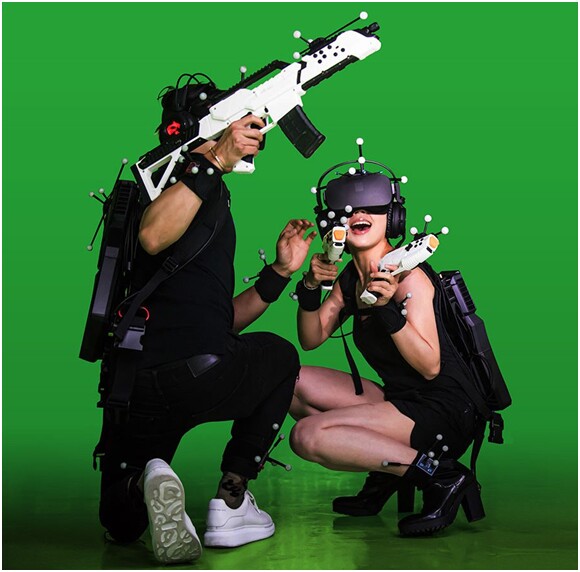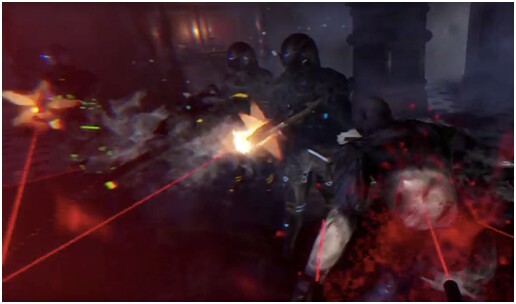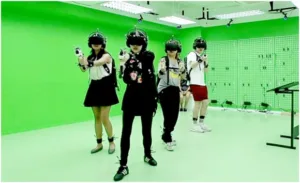Virtual Reality (VR) to most people, would include augmented reality and mixed reality, as the details of each type are not widely understood and virtual reality is the most widely used term.

With article after article, VR is everywhere. Just within Display Daily, there are many articles published in the past 12 months from how it works to various products and their reviews. There is no doubt that VR will continue to be developed and applied to various applications especially in the gaming industries where Real Realities (RR) of the battle fields, for example, cannot be created except in VR.
I was in Hong Kong a couple of weeks ago and one night, I turned on the TV. The programme that was showing was an interview with Steve Chao who founded Glo, Inc. in 2016. (not to be confused with microLED company, gl? AB – Man. Ed.) Glo is building a “hyper-reality escape room” experience, which is a new type of virtual reality for location-based entertainment.
As mentioned in the interview, the Glo VR experience incorporates cameras, fixed cameras and player-attached cameras, such that images are captured, processed, and various scenes and characters are created. Most of the VR games deal with players wearing 3D goggles shooting at various targets generated by the software and these targets, as a result, are not “live”. Instead, they are computer-generated characters. Imagine that you are fighting and shooting with these pre-programmed characters – you may have a lot of fun, but may not have as much fun as if the characters are actually living persons. Steve Chao created such a virtual reality scenario in which the virtual enemies you are shooting at are actually your real friends who join the game with you (and share the expenses with you renting the facility where the game is held). Digitally, you and each of your friends are transformed into various characters, shooting at each other.
As described by Chao during the TV interview, he assembled a team of experts from various fields and spent four months non-stop, he really meant non-stop, without sleep as far as he “remembered” and came up with the first prototype demonstration. This demonstration was so successful that it contributed to the successful start of the whole venture. Glo Inc. was the first company to introduce such a VR experience in Hong Kong. The first introduction was “Deadwood Mansion”, a 30 minute VR experience that immersed a group of friends in the hunt for a crazy doctor accused of illegal experiments. It was very popular, especially in Japan leading the company to set their sight in franchising.
 White balls are used for position and direction sensing
White balls are used for position and direction sensing
The basic feature of the technology is the use of cameras, which sense the locations of various “components” which have multiple white balls attached to them, such as the hands, the rifles, guns, legs, etc., i.e. almost anything that moves. Each component is then mapped onto a character or a device in the VR world. Each player is inside a green room wearing normal clothes, which is the Real Reality (RR). Through the VR goggles, each player only sees the characters and devices in the virtual environment, which is the VR.
Players inside the green room (RR)
 How the players look in the VR environment
How the players look in the VR environment
In December last year, Glo Inc. partnered with IMax bringing the venue-based experiences to the US. (Regal and IMax Launch Virtual Reality Centre in Times Square – subscription req.) IMax licensed the GloStation technology platform – beginning with the zombie VR experience, Deadwood Mansion – for its flagship IMax VR Center in Los Angeles. Further centers will be rolled out in New York and other locations. Glo also raised $3 millions from Alibaba, Presence Capital, Mindworks Ventures and other angel investors. The funds will be used to speed up the content development and global presence through franchising.
The first showroom was opened in Hong Kong late June and was 100% sold out for the next 100 days. Weekend tickets are now booking months in advance, the company said. With the new investment, Glo will be able to deploy their proprietary free-roaming VR system GloStation to cities around the world. With such enormous success in such a short time, this could lay the new path for VR accelerating its development with new revenue channels and investments. I personally would like to get into one of the GloStation soon and experience the real VR experience myself first hand. – Kenneth Li

